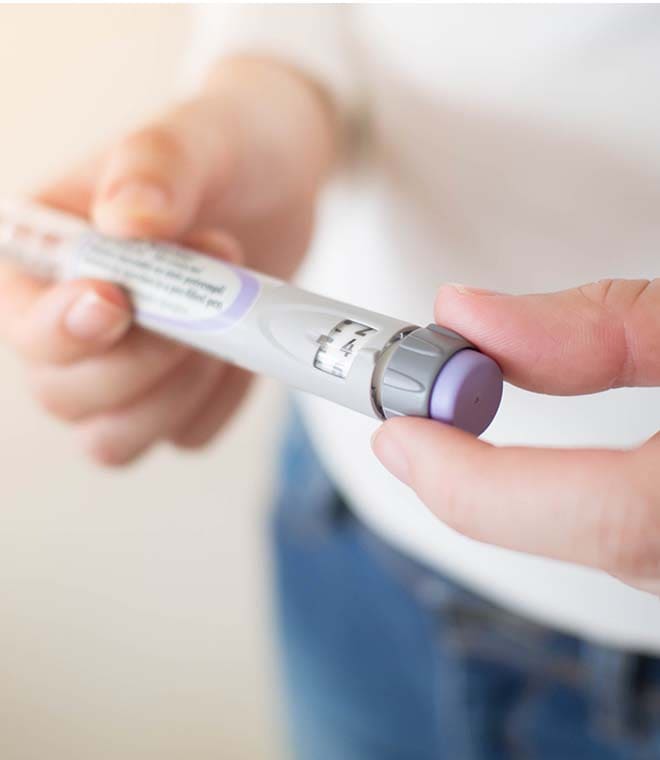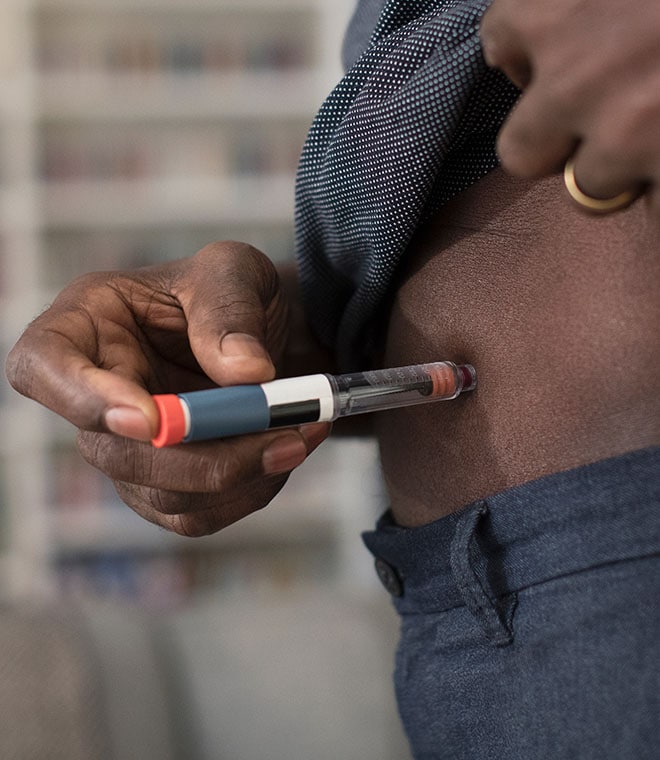Health
How enhanced screenings can help you manage your diabetes
By Christina Varvatsis, PharmD, BCPS Aug 08, 2022 • 7 min
Chronically high blood sugar can damage different parts of your body, including your kidneys, eyes, and feet. Fortunately, regular screenings can help identify problems early and prevent serious complications.
Kidney screenings
Diabetes can cause kidney damage that progresses over time (chronic kidney disease). Early detection and treatment can help slow the progression to kidney failure and help prevent the need for dialysis or kidney transplantation.
The American Diabetes Association (ADA) recommends testing kidney function at least once per year. This typically involves two tests:
- An urine test to check for albumin
- A blood test to calculate your estimated glomerular filtration rate, or eGFR
Albumin is a type of protein. Normally, there is very little albumin in your urine. Elevated urine albumin levels could be a sign that the filtering units in your kidneys have become damaged and leaky. To check your urine albumin levels, you’ll need to provide a urine sample at your healthcare provider’s office. A quick, in-office test using a dipstick can tell if protein is present in your urine, but samples are often sent to a lab for more accurate results.
eGFR measures your kidney function and estimates how well your kidneys are filtering waste and extra water from your body. For this test, your healthcare provider will take a blood sample to measure levels of creatinine—a waste product your body makes from dietary protein and muscle breakdown. Your eGFR can then be calculated using a formula that considers your creatinine levels, age, sex, and race.
High blood pressure puts individuals with diabetes at risk for kidney disease, so be sure to have your blood pressure checked at every appointment.
Eye exams
Over time, high blood sugar can damage the blood vessels in your eyes and increase your risk of diabetic retinopathy, an eye condition that can lead to vision loss and blindness. Diabetes can also increase your risk of other eye conditions, such as glaucoma and cataracts. Because early detection and treatment can help protect your sight, regular eye exams are an important part of managing your diabetes.
The ADA recommends most people with diabetes get an annual dilated eye exam, although your healthcare provider may recommend more frequent checks based on your risk factors. Because diabetic retinopathy and other eye conditions may not cause symptoms in the beginning stages, regular eye exams are essential for detecting problems early.
Dilated eye exams are a simple and painless procedure. Before your exam, an eye doctor will administer eye drops to dilate (or widen) your pupils. They then will examine your eyes for any signs of diabetic retinopathy or other eye problems.
Along with blood sugar control, keeping your blood pressure and cholesterol levels in a healthy range can also help prevent eye problems. Your healthcare provider will measure your blood pressure at each visit, and your cholesterol should be checked with a blood test once a year. Your healthcare provider may recommend less frequent cholesterol checks if you do not have high cholesterol or you are not taking any cholesterol-lowering medications.
Foot exams
Foot exams
Foot ulcers—or open sores—are a common diabetes complication. Unfortunately, if the ulcer becomes infected, your chance of needing an amputation (surgical removal of the toes, foot, or part of the leg) increases. Proper foot care, including regular foot exams, is essential for identifying and treating problems early.
ADA guidelines recommend people with diabetes receive a comprehensive foot exam at least once a year. If you have certain risk factors, such as loss of feeling in your feet or prior foot ulcers, you should have your feet checked at every visit.
A comprehensive diabetes foot exam should include:
- Inspecting your shoes for proper fit and asking questions about your footwear
- Inspecting the skin for any cracks, dryness, changes in color, calluses, blisters, ulcers, or infections
- Checking the toenails for crack or fungal infections
- Checking for foot deformities or changes in the shape or structure of the foot
- Performing the 10g monofilament test—a test that detects your ability to feel pressure on your feet using a thin wire
- Checking for pulses in your legs and feet
In addition to the 10g monofilament test, your foot exams should also include at least one of the following:
- Assessing your ability to feel vibration by placing a tuning fork against your foot
- Checking your perception of pain by softly poking your feet with a small pin (pinprick test)
- Evaluating ankle reflexes using a small hammer
It’s also important to check your feet every day at home, even when you’re feeling well. Contact your healthcare provider right away if you notice any signs of trouble, including blisters, cuts, scratches, or ulcers.
A1C tests
Unlike blood sugar readings, which provide a snapshot of your blood sugar control at a particular point in time, your A1C level indicates how well your blood sugar has been managed over the past three months. Higher A1C levels increase your risk of developing diabetes complications. Your diabetes care team will use your A1C level to determine how well your treatments are working and if any changes need to be made.
Your healthcare provider will measure your A1C with a blood test. The ADA recommends testing A1C levels at least twice per year if you’re meeting your treatment goals. However, your doctor may recommend more frequent monitoring if your diabetes therapy has recently changed or if you’re having trouble keeping your blood sugar in a healthy range.
There’s a lot to keep track of when it comes to managing your diabetes. But working with your healthcare provider to schedule these regular screenings can help keep you healthy and identify and treat any problems as soon as they occur.
Published August 2022



